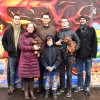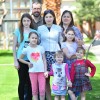Germany
- Surface:
- 357042 km2
- Inhabitants:
- 82056775
- Capital:
- Berlin
ECM works with several teams, particularly in the eastern German province of Mecklenburg-Western Pomerania and in the southwest of the country.
In eastern Germany, communism and after that economic difficulties left deep marks in the spiritual lives of the people. The Christian faith is reduced to the margins of society. Many people don't know what the Gospel is all about.
ECM desires to bring the Gospel to their attention again by active, living Christian communities, as a new message that gives hope for the future.
A large number of refugees from various religious backgrounds live in the southwest of the country. They try, with all their existing problems, to build a new life. ECM workers help support them and want them to get to know the Gospel.
ECM desires that they will find a new life in the Gospel that transcends all cultural differences and that they will be a shining light, not only for their community, but also for the Germans living near them.
-
Filter:
- Where we work
- Service opportunities
Turn on JavaScript to display the map
-

Jared & Verena Bradley
Cross Culture (Jared) & First Culture (Verena) Workers in Germany -

Sebastian & Fabiana Braun
Cross Culture Workers in Germany -

Gerrit & Jorine van Dijk
Cross Culture Workers in Germany -

Christiaan & Kseniya Kooiman
Cross Cultural Workers in Germany -

Caren
Candidate for Germany -

Rich & Ali
Cross Cultural Workers in Germany -

Theofil and Natascha Mayer
First Culture Workers in Germany -

Martin & Anja Teubert
Cross Cultural Workers in Germany -

Vimal & Louise Vimalasakaran
Cross Cultural Workers in Germany -

Gerard & Janneke de Wit
Cross Cultural Workers in Germany
-

Album ‘Whom have I in Heaven but you?’
- Type:
- Evangelism
- Ministry Type:
- Arts and Music
-

An Apartment for the Patchwork Centre
- Type:
- Missionary and social projects
- Ministry Type:
- Children and Youth, Mercy Ministries, Outreach and Evangelism
-

Berlin
- Type:
- Evangelism
- Ministry Type:
- Arts and Music, Church Development, Outreach and Evangelism
-

Christian Community Centre “Zum Gewächshaus”
- Type:
- Missionary and social projects
- Ministry Type:
- Children and Youth, Mercy Ministries, Missional Communities, Outreach and Evangelism, Pioneer Church Planting
-

Churchplanting
- Type:
- Missionary church development
- Ministry Type:
- Children and Youth, Missional Communities, Pioneer Church Planting
-

Patchwork Centre Church Planting
- Type:
- Church planting
- Ministry Type:
- Children and Youth, Mercy Ministries, Outreach and Evangelism
-

Rostock-Evershagen Community Outreach
- Type:
- Church planting
- Ministry Type:
- Children and Youth, Missional Communities, Outreach and Evangelism
-

Tamil Migrant Church in Frankfurt
- Type:
- Church planting
- Ministry Type:
- Children and Youth, Mercy Ministries, Outreach and Evangelism, Teaching (Language)
-

Tamil Migrant Church in Karslruhe
- Type:
- Church planting
- Ministry Type:
- Children and Youth, Mercy Ministries, Migrant Ministry, Outreach and Evangelism, Teaching (Language)
-
Church planting in East Germany
- Location:
- Schwerin - Germany
- Type:
- Short term
- Duration:
- Less than one month, 1-3 months, 3-6 months, 6-12 months
-
Ministry Worker in Berlin
- Location:
- Berlin
- Type:
- Long term
- Duration:
- 6-12 months, 1-2 years, 2-5 years
-
Short-term Ministry Worker
- Location:
- Berlin
- Type:
- Short term
- Duration:
- Less than one month, 1-3 months, 3-6 months, 6-12 months
-
Sharing a timeless message in new ways in Eastern Germany
- Location:
- Schwerin-Lankow, Germany
- Type:
- Short term
- Duration:
- Less than one month, 1-3 months, 3-6 months, 6-12 months, 1-2 years
-
Administrator/Member of Community Church Plant Team
- Location:
- Schwerin, Germany
- Type:
- Long term
- Duration:
- 5 years or more
-
Church Plant Team Members in Ribnitz-Damgarten, Germany
- Location:
- Ribnitz-Damgarten
- Type:
- Long term
- Duration:
- 1-2 years, 2-5 years, 5 years or more
-
Church Planting Team Members in atheistic Schwerin-Lankow
- Location:
- Germany
- Type:
- Long term
- Duration:
- 2-5 years

